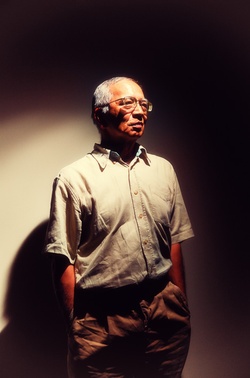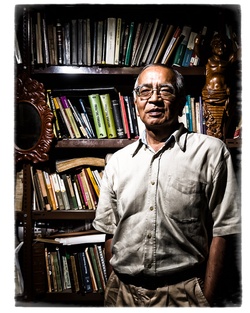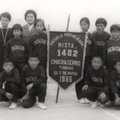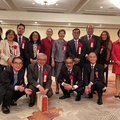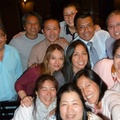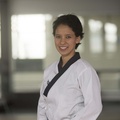Augusto Higa, ganador del Premio Nacional de Creación Literaria “José Watanabe Varas” 2012 convocado por la Asociación Peruano Japonesa, nos habla sobre su próxima novela, sus libros favoritos y su vocación literaria.
¿Qué está escribiendo?
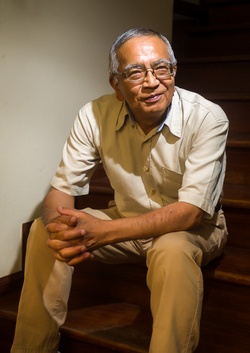
Augusto Higa obtuvo el Premio “José Watanabe Varas” de la APJ por su conjunto de cuentos Okinawa existe.
Este año pienso publicar dos libros. Siempre tengo proyectos, novelas, investigaciones. Por ejemplo, un trabajo sobre Ribeyro.
¿Sobre qué tratan los libros que piensa publicar?
Uno de ellos es Gaijin, una novela corta. Más o menos está en la línea de La iluminación de Katzuo Nakamatsu. Es la historia de un japonés que viene del norte. Hay el ambiente de la guerra. Ahí examino las contradicciones propias que tiene cualquier inmigrante que llega a un país extraño. Digamos, el racismo interior. Es un racismo que viene de los dos lados. En la sociedad nacional el migrante japonés era como el migrante chino y los negros. Son discriminados, pero a su vez los propios japoneses, chinos y negros discriminan a la sociedad. Y dentro de ese ambiente que se creó en el Perú hay personalidades como la de un Fujimori, un tipo totalmente hermético, inexpresivo. Ese tipo de personalidades son las que quiero desarrollar, son propias de una cultura a la defensiva.
Toda la historia de la inmigración japonesa ha sido una evolución constante. Se perdió el idioma japonés, se perdió la religión japonesa, se perdieron los colegios japoneses, se perdieron muchas de las costumbres, pero al mismo tiempo se va ganando en la peruanización, vas ganando otro idioma, otra religión, otras costumbres. Te vas asimilando mejor, pero siempre tienes características de extranjero. Ahí está más o menos el área en que trato de concentrarme.
¿Y el segundo libro?
Es una novela sobre el terrorismo.
La iluminación de Katzuo Nakamatsu recibió muy buenas críticas, fue considerada como una de las mejores novelas de 2008. ¿Le sorprendió la acogida que tuvo?
Fue una cosa sorprendente. La envié a dos o tres concursos y perdió todos. La publiqué con mucho temor, y para mí fue una sorpresa. La reacción crítica y de público fue muy favorable, incluso se acabó la edición. Tuvo buena acogida dentro de lo que un escritor nacional puede vender aquí en el Perú, que no es mucho, porque la gente no lee.
¿Qué está leyendo?
Un libro (ambientado) en la época de (Pablo) Escobar, El ruido de las cosas al caer, de Juan Gabriel Vásquez. Muy buena novela. Otro que estoy leyendo es una gran novela de Cormac McCarthy, que se llama Suttree. Probablemente McCarthy sea uno de los mejores prosistas y novelistas americanos. Este trabajo debe de haberle costado fácilmente unos diez años por las características, por la forma como escribe. Es un trabajo muy esmerado.
¿Qué libro lo ha marcado más?
Tengo un montón. Rulfo, García Márquez, Borges, que son clásicos. Faulkner, formidable. Ribeyro. Cuando sale Vargas Llosa deslumbra. Cuando yo terminaba el colegio aparecía Vargas Llosa, era toda una revolución.
¿Alguna obra que influyó particularmente en su vocación literaria?
Probablemente lo de Ribeyro. Yo tengo necesidad de leer a autores nuevos como Murakami, porque te dan una idea de cómo se está escribiendo en esta época, cuáles son las tendencias y qué problemas vienen agarrando.
¿Qué le gusta de la literatura japonesa?
Murakami es un gran autor. Kenzaburo Oe. Y dentro de los clásicos, Tanizaki. Kobo Abe, que escribió una novela que se llamaba La mujer de la arena.
¿Qué libros le recomendaría a un joven?
Es difícil, porque depende de las características de cada uno. Yo he tenido, por ejemplo, alumnos de literatura pero que no gustaban de la literatura académica, más bien gustaban de la literatura fácil.
¿Pero a un joven que sí le gusta leer?
Literatura latinoamericana. En la época de Vargas Llosa, de Ribeyro, los escritores peruanos y latinoamericanos se educaban con la literatura española, inglesa, norteamericana o francesa. A partir de los 60, nos nutrimos de la literatura latinoamericana. Es una variación tremenda. Como los rockeros que se alimentaban del rock en inglés, pero de pronto se empezó a crear el rock en español, el rock latinoamericano, que te influyen más. Hay que estudiar a los autores latinoamericanos, desde los clásicos hasta los más recientes. Y no puedes dejar de leer a Carver, a Cormac McCarthy.
¿Tiene un horario para escribir? ¿O solo lo hace cuando siente ganas?
No, tienes que escribir de manera permanente. Yo ya estoy en la etapa terminal. Mi etapa de aprendizaje ya terminó. Yo leo este tipo de novelas (El ruido de las cosas al caer y Suttree) porque me enriquecen. Me permiten estar en contacto con otras literaturas, otros problemas, y por lo tanto enriquecen tu imaginación y tus posibilidades de crear. Como estoy en una etapa terminal, me fijo horarios de trabajo. Por ejemplo, en estos momentos en que estoy de vacaciones, toda la mañana, hasta 1, 2 de la tarde, estoy escribiendo, corrigiendo.
¿Qué representa escribir para usted?
Es un imperativo, una catarsis, una necesidad. Es realizarte a ti mismo, es encontrarte, es tener la satisfacción de hacer aquello que te gusta hacer. Supongo que debe de ser la misma satisfacción que tienen el artista plástico, el rockero, el abogado, el economista, el chofer, si hacen bien su trabajo, si hacen bien aquello que quieren realizar. Es una manera de ampliar tu mundo.
No se imagina no escribiendo.
No, no. Hay algunos escritores que señalan que son más lectores que escritores. Es el caso de Borges. Él explicaba que era un mejor lector que escritor. En cuanto a la lectura, tengo variedad de libros que leer, desde filosofía, historia… Hace dos días estaba hojeando Diálogos de Platón, es extraordinario. En Fedón, por ejemplo, te explica el alma, y estamos hablando de un escrito de 400 a. C. También he estado hojeando Utopía de Tomás Moro. Pero desgraciadamente tengo que concentrar mis lecturas para las cosas que estoy haciendo, ya no puedo leer tanto como en mi periodo de aprendizaje. Por ejemplo, ya no puedo leer todo Cormac McCarthy, solo dos o tres (libros). De Murakami solo he leído dos o tres. Ya no puedo leer todo.
¿Algún autor o libro al que siempre vuelve?
Kakfa, Faulkner, Borges. Tengo un libro al cual siempre vuelvo: Del sentimiento trágico de la vida, de Unamuno. Es un libro sobre teología, filosofía, religión. Unamuno era un filósofo existencialista. Te va hablando de su manera muy particular de sentir el cristianismo, te abre todo un campo. Tiene reflexiones sobre el amor, sobre la inmortalidad del alma. Todos esos problemas me interesan y siempre vuelvo a ese libro.
¿Es creyente?
Soy cristiano, católico, pero no practicante en el sentido de que no voy a misa, no me confieso. No he desarrollado esa mecánica. Pero sí estudio la Biblia. La Biblia es otro gran libro sobre el cual siempre hay que volver. Curiosamente en los libros que he escrito siempre hay influencia de la Biblia.
¿Por cuál de sus libros siente más cariño?
La Casa de Albaceleste. Fue escrita en los años ochenta y son los cuentos más creativos que he escrito. Por eso les tengo mucho cariño. Significaron mucho en los años de conflicto, de carestía, de inflación. Para mí fue un gran aislamiento dedicarme a eso. En los años ochenta yo escribí tres cosas: La Casa de Albaceleste, Final del Porvenir y una tesis sobre Ribeyro con la cual me licencié en Literatura.
¿Se siente más cómodo en el cuento o en la novela?
En estos momentos en la novela corta. Yo ya no puedo escribir libros de 200, 300 páginas. Para mí ya es mucho, es una labor muy fuerte. Me he ceñido a novelas cortas. Tiene que ser corta porque yo trabajo mucho la prosa, una frase me cuesta mucho porque estoy consultando con diccionarios, tengo seis o siete.
Nadie escribe para ganar dinero en el Perú.
Es un poco difícil publicar acá. Lo que vas a ganar por publicar ni para el café. Bien difícil. En fin, la cosa es así. No ganas mucho, pero es divertido. O por lo menos no estás resentido. No sé quién me decía el otro día que la alegría, la felicidad de los creadores es más permanente que la de los profesionales que no se dedican a la creación. “Ustedes son más felices”, me decían.
* * *
OKINAWA EXISTE
Augusto Higa ganó el Premio Nacional de Creación Literaria “José Watanabe Varas”, convocado por la Asociación Peruano Japonesa. El jurado compuesto por los escritores Marco Martos, Hildebrando Pérez y Carlos Calderón acordaron otorgarle por unanimidad el máximo galardón a Higa por el libro de cuentos Okinawa existe. A continuación, publicamos un extracto de uno de los relatos:
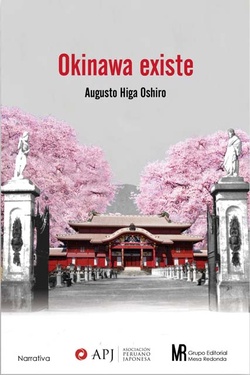
El libro Okinawa existe se publicó en julio de 2013 (Coedición de APJ y Grupo Editorial Mesa Redonda).
“A las seis de la mañana, la obaachan Miyagui abrió los ojos. Había tenido un sueño trabado. Todavía en el letargo, observó que las paredes y las sillas danzaban irreales. Esperó un momento. Sintió una garra de frío en el vientre, como siempre. Y sin saber por qué, no pudo frenar su presagio: ese día, sin falta, urgente, vendría la muerte. Transcurrieron minutos para reponerse. De manera que a sus setenta y seis años, abismada en el delirio, ingresó en la cotidianeidad. Arregló la cama. Se cambió de ropa. En el baño, suspendida en el instante, se mojó la cara, y cepilló sus dientes. Sin dejar de suspirar, en el espejo vio una bandada de pájaros matinales. Otra vez en el dormitorio, tras la ventana a la calle, descendió la lluvia irremediable de cangrejos. La obaachan Miyagui no dijo nada, tampoco pensó nada, escrupulosa y puntual, escuchó ruidos en la trastienda: sus nietos tomaban desayuno, partían rumbo al colegio. Lo demás, las siguientes horas, era una repetición exacta de los días anteriores. Sin reconvenciones, mecánico y ritual, su hijo Yochan corría las cortinas del negocio, una tienda de abarrotes en la esquina de Huancavelica y Angaraes.
Después del frugal desayuno, la obaachan Miyagui se colocó en su puesto, una esquina detrás del mostrador, sentada en un banco. Con los ojos suspendidos en la puerta, el rostro severo e inmóvil, miró ingresar a los clientes de la mañana. Trabajadores en mangas de camisa. Amas de casa rijosas. Peatones ofuscados. Eran los moradores del barrio, sí, allí estaban, marrulleros y pacíficos, en busca de leche, mantequilla, cigarros. Atendían Yochan y su mujer, la bella Fusako, una nisei amable y de pronta sonrisa. En oleadas, por turnos, la gente ingresaba y salía; se escuchaba el zumbido de palabras, el crujido de las monedas en el vidrio, los sordos cucharones en las bolsas de azúcar. Como a las nueve apareció el chofer Ródenas, bebió una gaseosa, se acercó a la obaachan, y preguntó intempestivo:
–¿Quién es el presidente del Perú, abuela?
Ella contestó rumorosa:
–¡Leguía!
Soltó la risa el chofer. Pendeja la viejita, dijo, vive recluida en otro mundo. Atajó Yochan: está con sus dioses, en el paraíso. Festejaron. Rieron. Charlaron. La mañana bajaba sin sobresaltos, tranquila, sin asperezas. La obaachan Miyagui permanecía impávida, observando la calle, el movimiento de vehículos, los transeúntes coloridos, el rumor esquinero. Fue entonces que brotó una luz amarilla, aparecieron caballitos de mar, increíbles danzaron en el aire, espolvorearon un grano fino de polvo, luego desaparecieron de su mirada. Quedó el olor a mariscos. Caducidad de lo fugitivo. Lo que no vuelve y no se repite. La obaachan Miyagui sonrió, como si se sacudiera del sopor, tal vez de la irrealidad. No obstante, soltó un par de lágrimas, ella que jamás había llorado. ¿Nostalgia? Quizá. ¿Tristeza? Es posible. ¿Se despedía del mundo? No. En todo caso, en aquel momento de su letargo, a lo lejos, como sorprendida del tiempo y la distancia, escuchó a su nuera Fusako, quien la requería para el almuerzo. Así lo hizo. Regresó al comedor abarrotado de mercancías. Tomó la sopa. Pausada. Comió las verduras. Sin prisa, ingirió el arroz. Bebió el té de la mesa. Más tarde, arribaría Michan, la hija menor, para hacer el relevo de la tienda. La obaachan Miyagui se sintió eximida de responsabilidades. Entonces fue a su dormitorio, se puso un camisón, e hizo una siesta. Soñó.
* Este artículo se publica gracias al convenio entre la Asociación Peruano Japonesa (APJ) y el Proyecto Discover Nikkei. Artículo publicado originalmente en la revista Kaikan Nº 74, y adaptado para Discover Nikkei.
© 2013 Asociación Peruano Japonesa; © 2013 Fotos: APJ / Álvaro Uematsu



